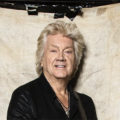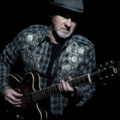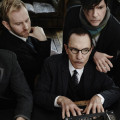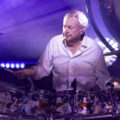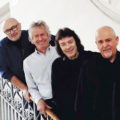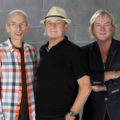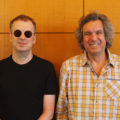A saucerful of “Insolo” secrets from Gary Kemp of Spandau Ballet and “The Bodyguard”
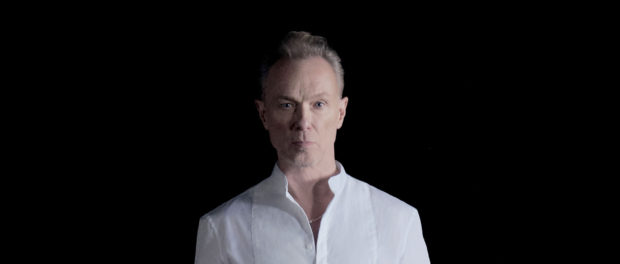 Photo provided by BB Gun Press
Photo provided by BB Gun Press
The primary songwriter of England’s Spandau Ballet, Gary Kemp, is responsible for ageless ballads such as “True,” “Gold” and “Through The Barricades,” alongside several turntable’s worth of synth-pop diamonds.
In between the band’s entry in the New Romantic movement to a pair of record-shattering reunions, the co-founder and guitarist stepped into acting for starring roles in numerous West End plays, plus mega movies “The Krays” and “The Bodyguard” (alongside none other than Whitney Houston).
And he’s steadily kept the surprises coming, from joining pal and Pink Floyd originator Nick Mason’s Saucerful Of Secrets, to starting the “Rockonteurs” podcast with fellow friend/group member Guy Pratt (formerly of Icehouse and also a constant Floyd collaborator).
Despite the non-stop schedule, Kemp just released the new album “Insolo” (after more than 25 years since working entirely on his own), which as he describes to Concert Reviews, taps into every aspect of the multi-talented entertainer since growing up as a disciple of David Bowie.
What made you want to tackle these songs on your own rather than the band setting?

Photo provided by Joe Magowan
At the same time, [I was] probably a little bit frustrated that I’m only ever doing other people’s songs and desperately wanting to create my own music. Then I think reaching a certain age and thinking, “I really need to think about certain things that are playing in my mind and I need to get them down in songs.” A few themes started to develop and I was going to go back on the road with Nick Mason, but that got canceled when lockdown happened. I was at home with my three boys and my wife doing home schooling. I thought, “well, if they’re doing home schooling, I better start doing some home recording.”
Had you already started this material or did it come from scratch at home?
Kemp: I started writing this when I was on tour with Nick Mason in America in 2019, and then I started putting the music together, demo form, in my little studio here. Then I started to go into a recording studio to do some vocals with my friend Toby Chapman, who’s going to co-produce it with me. It was a way of committing myself to doing the album. I thought if I just did vocals at home, it would never happen. I needed to properly commit, pay some money, go into RAK Studios and do the thing. Then when the lockdown happened, I already had quite a few of these demos, but it was at that point I got in touch with other musicians, wanting to replace the drums and the bass for real.
I went to Guy Pratt, who I played with and plays with Pink Floyd. I went to Roger Taylor from Queen and he played on “Too Much.” [I also went to] Ash Son, who plays on lots of pop records over here, like Adele. We gradually started building these tracks, and then in the summer, things opened up and I was able to play in the studio. There was a real sense of presence about a song like “Insolo,” which I’d written before the pandemic, and suddenly I’m in there with an orchestra and they’re all socially distanced, living out the lyrics in front of me. I also did a lot of guitars and then it went back into lockdown, but we carried on with the mixing. I think what happens is artists have forces of opposition that come at them and they have to step to the left or to the right to get around them. The disciplines created by lockdown gave me the canvas size, the constraints that I needed to be able to make the record, rather than any options. “Oh, I’ll do it next week. It doesn’t matter. Let’s get in the studio.” I felt like there was an urgency to finish it before everything went back to normal.
Tell us a bit about the thoughts and themes that run throughout the album.
 Kemp: One of the main ones was a sense of looking back on my life. How does that fit in to who I am now? That’s what some of these early songs, like “I Remember You” and “I Am The Past,” were definitely about. All my life, I get shown images that had stuff to do with my youth and it’s a big part of me that follows me around. I’m happy with what I’ve done, but I’ve been with my wife for 20 years. She’s younger than me, she never experienced that person and I don’t always want to be tied to the past like that. “I am the past trying to be here” was a theme that started to resonate to me, but also writing the song “Waiting For The Band,” which is about being a fan. That came at me while I was sitting at the piano one day and my 13-year-old self walked into my head, into the room. I started to write about this kid who had all that passion for music, and anticipation, and hope that they would discover the artist that they love and I started to write a song about him. I realized by the end of it that I still have that feeling inside of me. I’m still waiting for that band to appear on stage. It’s kind of a metaphor for hopefulness, really, and for a blinding experience that allows us to be enthusiastic about art.
Kemp: One of the main ones was a sense of looking back on my life. How does that fit in to who I am now? That’s what some of these early songs, like “I Remember You” and “I Am The Past,” were definitely about. All my life, I get shown images that had stuff to do with my youth and it’s a big part of me that follows me around. I’m happy with what I’ve done, but I’ve been with my wife for 20 years. She’s younger than me, she never experienced that person and I don’t always want to be tied to the past like that. “I am the past trying to be here” was a theme that started to resonate to me, but also writing the song “Waiting For The Band,” which is about being a fan. That came at me while I was sitting at the piano one day and my 13-year-old self walked into my head, into the room. I started to write about this kid who had all that passion for music, and anticipation, and hope that they would discover the artist that they love and I started to write a song about him. I realized by the end of it that I still have that feeling inside of me. I’m still waiting for that band to appear on stage. It’s kind of a metaphor for hopefulness, really, and for a blinding experience that allows us to be enthusiastic about art.
Do you think that kind of “Waiting For The Band” experience could be replicated today as so much of music’s focus has shifted online?
Kemp: In those days, you had to dress up and then go out. You had to find your place. It was a sort of psychic geography of London that I had to go to a certain venue. I didn’t exist unless I arrived there. Now we can exist in our living room globally…Our whole lives are based on likes. It’s like that character in that song, “Insolo.” He’s walking in this busy city and he’s just looking at his phone waiting for a “like” on some comment he’s left. It’s not the same [now]. I’m telling the story of what happened to me, but I think enthusiasm for artists is still there. Artists allow us to see ourselves on a bigger stage. Literally, they give us something to quest for. I’ve had the experience of being on that stage as well and I can honestly say it’s never as thrilling when you’re up on that stage as when you’re in the audience. I also wanted to write a song that had some musical junctures that could go off into different areas in the same way that bands used to in the old days.
Can you compare and contrast this project with how you’re already known?
Kemp: There are tracks on this album that you could say, “oh, that sounds like a Spandau Ballet place where that would be” and “this sounds more Pink Floyd,” so I suppose there’s a whole scrapbook of my upbringing. It’s lot of music that inspired me as a younger man, from prog rock to soul. I think there are tracks that are obviously stone set Gary Kemp songs, like “Ahead Of The Game” or “Too Much.” They’re songs I could’ve possibly written for Spandau Ballet. Even though I think they’re quite ‘70s in sound, they’ve got a blue-eyed soul feel to them. And then other songs that I’ve obviously been allowed to spread out more given the inspiration of working with Nick Mason and Pink Floyd’s music catalogue. I’m allowed to make a song that’s six-and-a-half minutes, has a lot of turns and it’s dramatic in places. I think drama is one thing that comes across on this record. I think me being an actor and trying to inhabit certain characters that I’ve written for the record, setting them in grand settings sometimes, like on “The Haunted” or “Insolo.”
 [As a guitarist], I was never really allowed to stretch out with Spandau. We had a saxophonist and he always took the solos. But I grew up on Mick Ronson, from David Bowie’s band, Peter Frampton and Pete Townshend. I think I always had it in my armory, but I just never had a use for it with Spandau really. Sometimes playing live, I could throw in solos, but I think the journey with Nick has been definitely about re-discovering that instrument because I saw myself primarily as a songwriter in Spandau Ballet, not as a guitarist/songwriter. Everything was about serving the song rather than “oh, I’ve got to also serve myself as a guitarist.” But I think on this album, this is my other voice. I’ve found a lead style that speaks for me, about me, and I can express myself emotionally through the solos. I think solos have to be melodic. I think they have to be expressive. I don’t think they have to be improvised. I think they have to play a role, like a string part would play in an orchestration.
[As a guitarist], I was never really allowed to stretch out with Spandau. We had a saxophonist and he always took the solos. But I grew up on Mick Ronson, from David Bowie’s band, Peter Frampton and Pete Townshend. I think I always had it in my armory, but I just never had a use for it with Spandau really. Sometimes playing live, I could throw in solos, but I think the journey with Nick has been definitely about re-discovering that instrument because I saw myself primarily as a songwriter in Spandau Ballet, not as a guitarist/songwriter. Everything was about serving the song rather than “oh, I’ve got to also serve myself as a guitarist.” But I think on this album, this is my other voice. I’ve found a lead style that speaks for me, about me, and I can express myself emotionally through the solos. I think solos have to be melodic. I think they have to be expressive. I don’t think they have to be improvised. I think they have to play a role, like a string part would play in an orchestration.
How much were you aiming for an element of surprise?
Kemp: I think it’s good to keep people surprised. I think it’s worth taking risks sometimes. People think they know you. They pigeonhole you. Recently, I’ve been doing this Rockonteurs podcast, which I do with Guy Pratt, and it’s doing really well. It came out that I grew up buying Genesis records with Peter Gabriel and Yes, and that I liked prog rock. It was like, “really, that can’t be true! You’re Gary Kemp!” “You don’t know my record collection man!”
When I did “The Krays” movie with my brother [Martin Kemp] in 1990, about the Kray twins, these famous, iconic gangsters, everyone in Britain said, “why have they chosen a couple of guys from Spandau Ballet to play the Krays?” But we did it, we nailed it and it’s now a classic movie. I like to keep people guessing and keep yourself guessing. I recently did some Al Pintor, who’s a serious playwright here in town, and it got great reviews. I like to take those risks, push the box open a bit and get out. I don’t know why I do it half the time because it’s terrifying, but it’s worth it.
Another major movie you’re in is “The Bodyguard.” Take us onto the set, including what it was like to work alongside Whitney Houston and Kevin Costner.
Kemp: It was a beautiful movie to make. I spent four months on that set. My experience of Whitney was extraordinary. She was such a beautiful person. It was before she got broken. I probably saw the best of her. She would hang out with the crew and be on the set. She was never hiding away in her caravan. She sang gospel in the make-up room in the mornings and I’d be sitting next to her at 6 a.m. hearing that beautiful voice. She was hugely respectful to everyone around her who was experienced in making movies.
Kevin was great. He was very embracing. He told me that the song “True” belonged to him and his wife, which I thought was nice. I thought it was odd because I thought it belonged to my plumber, who told me the same thing [laughs]. It was a great, amazing to be part of that Hollywood set up. I just wish I got one of my songs on the soundtrack!
 Even so, “True” is a certified classic. What are unexpected ways it’s been embraced?
Even so, “True” is a certified classic. What are unexpected ways it’s been embraced?
Kemp: Well, three times in “The Simpsons.” I mean once, you think, is enough and then you get it three times. It’s been in like every generation of kids who watch “The Simpsons.” It gets re-delivered. I suppose being welcomed by the Black community, by Black radio stations was the biggest surprise for me. I remember when that happened with “True,” we ended up being, I think, the third White act ever to go on “Soul Train.” That was a big deal for me because I’d grown up buying Black music as well: Stevie Wonder, Marvin Gaye, lots of disco records in the ‘70s…Its longevity is so surprising and I’m lucky. Longevity is shocking when it happens. I think I got an award just recently for five million airplays in America. That doesn’t sound like a billion streams, but airplays on radio stations, that’s a lot!
How would you describe your relationship with America, and specifically Chicago, along with what it’s like overseas?
Kemp: I remember being in Chicago, [playing at] House of Blues and Chicago Theatre, and walking around the city. It’s a fantastic city. The history of music coming out of Chicago is extraordinary. It’s always an honor to come in and play there…I think America saw Spandau for a much shorter period. In Europe, we were spread out for the whole decade. In Europe, we’re the same as we are in the UK, Australia and the Far East. It’s a very successful band. I think America embraced more of a smaller moment for us, but that’s okay. There’s a lot of reasons for that. Spandau Ballet’s a known group and has fans everywhere. What’s really nice on social media, I see a lot of younger people coming through obsessed with the ‘80s, of what it was like to live in that decade, or be an artist, or dress up, or be a fan in that decade. There are a half-a-dozen to ten acts that represent that decade and we always seem to fit into that. That’s pretty cool.
What role do you feel the band played in the New Romantic movement?
Kemp: It was kids who were influenced by glam rock, growing up on Bowie, T. Rex and Roxy Music. Punk had finished and I think we all just wanted to get back into looking crazy in a way that we could afford. We never brought clothes. We made them ourselves or we brought them in thrift stores. We put makeup on, danced to electronic music and that was the beginning. There was a club in London that did it on a Tuesday night run by a guy called Steve Strange. That’s the worst night of the week, so any guy who wants to take over a club normally takes it over on a Tuesday. And there was a club up in Birmingham called The Rum Runner, where Duran Duran started, and I think it was taking modern music into the next decade, embracing color and video. It was a British scene of kids who had been inspired by glam rock, punk and Chic. It’s a combination of all that kind of music coming together and British kids just did that really well.
 What’s your crash course on Spandau’s run?
What’s your crash course on Spandau’s run?
Kemp: We were at the beginning of what became New Romantic at the Blitz Club and we started off as a cult band playing electronica. But by 1983, I decided I wanted to write blue-eyed soul songs and I did. They were successful and we found a sound that was a lot different to those first two albums, but suited Tony Hadley’s voice, his craft, and suited the brilliant musicianship of Steve Norman on saxophone. As we grew and we turned into a band that could play arenas, then the sound got bigger and more dramatic, like in “Through The Barricades.” And then we beat each other up like all bands [laughs].
Might you be able to shed light on what happened after the reunion and if you ever feel another one would be possible?
Kemp: Well, we’ve had two reunions and there was actually an attempt to do something without Tony about three years ago. No, it’s not possible now. I think there’s been too many times we’ve tried it and it always ends up in acrimony. You know, I just think we were kids at school. We didn’t start as friends who happened to form a band. We formed a band because we were the only musicians in the school and we gravitated to each other. So you’re not even starting on friendship. You’re starting on musicianship. “He can play drums, get him in. He can sing, get him in.” I think the real friendship was really me and Steve Norman, and my brother and me obviously. There was a friendship in the band of course, but as we grew older, we weren’t 24/7 the group. We started to develop into different people. We wanted different things and we don’t always want different things at the same time. When I was ready to quit the band, other people weren’t and that causes problems. Same as any group, you can’t stay together forever. After I speak to you, I’m gonna be talking to Mick Fleetwood from Fleetwood Mac on our podcast. I’ve just been doing some research on him. How many people have been in Fleetwood Mac? My God man, it makes Spandau Ballet look like the greatest friends on earth!
For additional information on Gary Kemp, visit GaryKemp.com.


